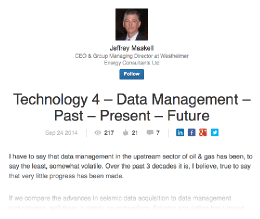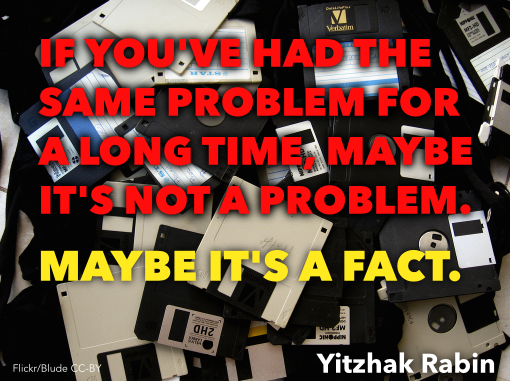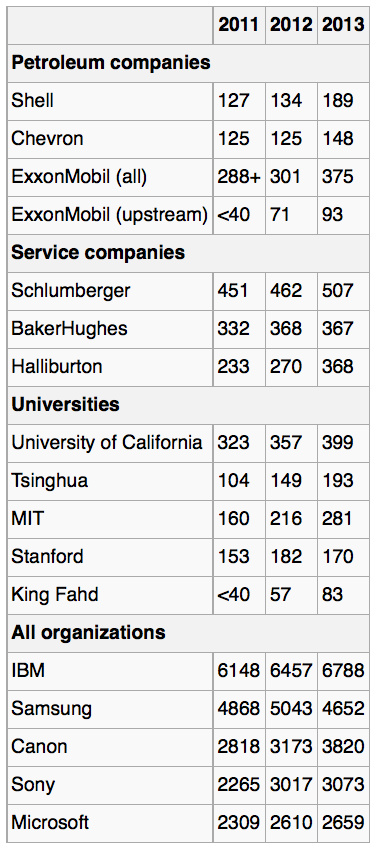10 ways to improve your data store
/ When I look at the industry's struggle with the data mess, I see a parallel with science's struggle with open data. I've written lots about that before, but the basic idea is simple: scientists need discoverable, accessible, documented, usable data. Does that sound familiar?
When I look at the industry's struggle with the data mess, I see a parallel with science's struggle with open data. I've written lots about that before, but the basic idea is simple: scientists need discoverable, accessible, documented, usable data. Does that sound familiar?
I wrote yesterday that I think we have to get away from the idea that we can manage data like we might manage a production line. Instead, we need to think about more organic, flexible strategies that cope with and even thrive on chaos. I like, or liked until yesterday, the word 'curation', because it implies ongoing care and a focus on the future. But my friend Eric Marchand was right in his comment yesterday — the dusty connotation is too strong, and dust is bad for data. I like his supermarket analogy: packaged, categorized items, each with a cost of production and a price. A more lively, slightly chaotic market might match my vision better — multiple vendors maintaining their own realms. One can get carried away with analogies, but I like this better than a library or museum.
The good news is that lots of energetic and cunning people have been working on this idea of open data markets. So there are plenty of strategies we can try, alongside the current strategy of giving giant service companies millions of dollars for their TechCloud® Integrated ProSIGHT™ Data Management Solutions.
Serve your customer:
- Above all else, build what people need. It's amazing that this needs to be said, but ask almost anyone what they think of IT at their company and you will know that it is not how it works today. Everything you build should be in response to the business pulling.
- This means you have to get out of the building and talk to your customers. In person, one-one-one. Watch them use your systems. Listen to them. Respond to them.
Knock down the data walls:
- Learn and implement open data practices inside the organization. Focus on discoverability, accessiblity, documentation of good-enough data, not on building The One True Database.
- Encourage and fund open data practices among providers of public data. There is a big role here for our technical societies, I believe, but I don't think they have seen it yet.
I've said it before: hire loads of geeks:
- The web (well, intranet) is your pipeline. Build and maintain proper machine interfaces (APIs and web APIs) for data. What, you don't know how to do this? I know; it means hiring web-savvy data-obsessed programmers.
- Bring back the hacker technologists that I think I remember from the nineties. Maybe it's a myth memory, but sprinkled around big companies there used to be super-geeks with degrees in astrophysics, mad UNIX skills, and the Oracle admin password. Now it's all data managers with Petroleum Technology certificates who couldn't write an awk script if your data depended on it (it does).
- Institute proper data wrangling and analysis training for scientists. I think this is pretty urgent. Anecdotal evidence: the top data integration tools in our business is PowerPoint... or an Excel chart with two y-axes if we're talking about engineers. (What does E&P mean?)
Three more things:
- Let data live where it wants to live (databases, spreadsheets, wikis, SharePoint if you must). Focus on connecting data with APIs and data translators. It's pointless trying to move data to where you want it to be — you're just making it worse. ("Oh, you moved my spreadsheet? Fine, I will copy my spreadsheet.")
- Get out of the company and find out what other people are doing. Not the other industry people struggling with data — they are just as clueless as we are. Find out what the people who are doing amazing things with data are doing: Google, Twitter, Facebook, data.gov, Wikipedia, Digital Science, The New York Times, The Guardian,... there are so many to choose from. We should invite these people to our conferences; they can help us.
- If you only do one thing, fix search in your company. Stop tinkering with semantic ontologies and smart catalogs, just buy Google Search Appliance and fix it. You can get this one done by Christmas.
Last thing. If there's one mindset that will really get in the way, it's the project mindset. If we want to go beyond coping with the data mess, far beyond it to thriving on it, then we have to get comfortable with the idea that this is not a project. The word is banned, along with 'initiative', 'governance', and Gantt charts. The requirements you write on the back of a napkin with three colleagues will be just as useful as the ones you get back from three months of focus groups.
No, this is the rest of your career. This is never done, next year there are better ideas, more flexible libraries, faster hardware, and new needs. It's like getting fit: this ain't an 8-week get-fit program, it's an eternity of crunches.
The photograph of Covent Market in London, Ontario is from Boris Kasimov on Flickr.




















 Except where noted, this content is licensed
Except where noted, this content is licensed